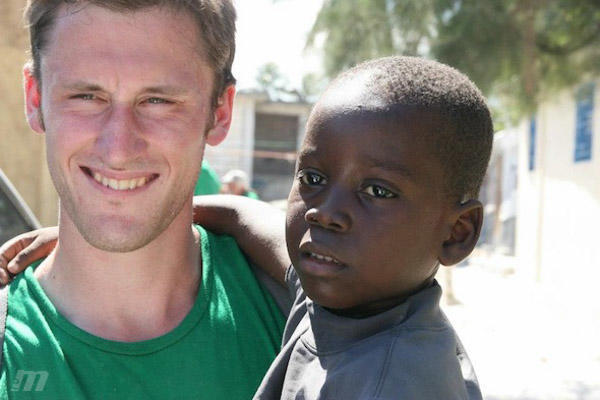
A couple years ago I was coordinating a team that was cleaning up rubble from the Haiti earthquake. Our crew of American volunteers and hired Haitians had formed a bucket brigade down a narrow alley to a dump truck on the street. It was hard, hot physical labor so we were all fatigued and drenched with sweat. I've worked with several such teams, and I've found that people in the community rarely offer to help. I see strong capable men watching as young teenagers pass heavy buckets down the line. With unemployment reaching staggering proportions in Haiti, times are pretty desperate and everyone's looking for a job but nobody's lending a hand.
However, on this particular day we did have one eager helper. There was a little boy who was probably 4 or 5 years old, and he was trying to pass buckets. Soon realizing that the full ones were too heavy, he started passing back the empty ones. At one point I had to physically pick him up and set him aside for fear he would get hurt, but he was determined to return and work. He was more of a hindrance than a help, but I had to admire his spirit.

As I look back I consider the difference between this little boy and the grown men watching us work. He was eager to help and full of energy and hope. He saw a bunch of adults working hard, and he wanted to feel like he was big and he could help too. In contrast, most of the local men were stronger and more capable than any of our volunteers, but they had no inclination to lift a hand. I pondered the fact that each man sitting by the worksite was also once an eager young boy.
So what happened?
Every story is unique but I think the short answer is this ... life happened. Let's face it; life can have a way of beating people down. This is especially true in a country like Haiti where people struggle with extreme poverty. Most of those men watching our teams work aren't watching because they're lazy. They're watching because they view the ability to give charity as a luxury of the rich. As poor people their focus must be looking after themselves and their families. Even when they work hard, they feel inadequate because they still can't make a decent living. They've long since had to put their dignity aside and do whatever they can just to survive. They are willing to work, but they may have had to lie, cheat, or steal for their bread. Ultimately everything they do is about survival, and they feel that life leaves no alternative.
I've been working in various developing countries for about 10 years now, and I've witnessed much poverty. I've spoken with young men close to my age who are bored and frustrated because they never had the opportunity go to college and build a career like me. I've seen single mothers who are scared because they have no way to provide for their babies. I've known families living in one room homes who can't afford a couple sheets of tin to fix their leaking roof. I've encountered parents who watch other people's children walk to school in their freshly pressed uniforms while their own children sit at home in dirty old t-shirts. They may be struggling just to give their kids enough to eat. I can only imagine what it must be like as a parent to come home and look at your children's hungry faces yet have little or nothing to give them.
You see poverty does more than just deprive people of comfort. It also robs them of something much deeper. It robs them of that little something that's in all of us from birth ... that thing that made that little boy want to pick up a bucket and learn how to work. It's that thing inside of us that needs meaningful work to feel a sense of self worth. That is why we all need the opportunity to work in order to build a good life for ourselves and those we love. Extreme poverty robs people of their sense of personal dignity by stripping them of that opportunity.
Every human being should have the opportunity for meaningful work with adequate income to provide for themselves and their families.
People need more than just money; they need purpose and significance. Poverty is paradoxical. While it is by definition a lack of money or resources, money and resources alone can't fix it. If we just give people a handout they will probably accept it, but we may further strip them of their dignity by reinforcing the lie that they have nothing to offer because they are poor. That is why our goal should not be to merely meet people's material needs. Rather we should empower them to meet their own needs.
I've helped to coordinate hundreds of building projects on short term mission trips, but I usually end up frustrated. Yes, we may have repaired a family's home or even built a home, but while we walk a way feeling good about our service they remain unable find a good job to provide for their families. In the end, we feel big and they feel small.
This is why at Experience Mission we're moving toward programs that provide opportunity rather than handouts. This is the idea behind our Education and Microloan programs. Our Education Program empowers young people through scholarships enabling them to continue school, and our Microloan Program helps families in need with small loans to create or expand their own business.
We asked some of our Haitian staff members if they would prefer a loan for a business or a free home? One of the younger ones responded that he would rather earn his house because it makes him "feel like a man." You see, deep down we are all a bit like that little boy. We just want to grow up and realize that we have something of value to offer.
LEARN MORE | Empower communities around the world by supporting RISING, EM's Education program.
Site developed and hosted by Skycog, Inc.
